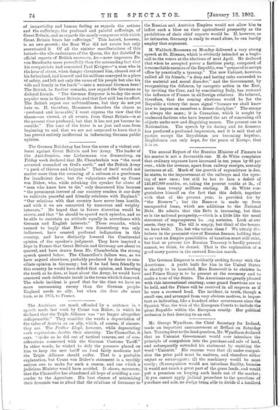The German Reichstag has 'been the scene of a violent
out- burst against 'Great Britain and her Army. The leader of the Anti-Semites, one Liebermann von Sonnenberg, on Friday week declared that Mr. Chamberlain was "the most accursed scoundrel on God's earth," and the British Army "a pack of thieves and brigands." That of itself would not matter more than the swearing of a. cabman at a, gentleman for insufficient fare; but the vulgarisms called up Count von Below, who, while rebuking the speaker for abuse of "men who know how to die," only denounced him because "the permanent interest of our country renders it our duty to cultivate peaceful and friendly relations with England." "Our relations with that country have never been hostile, and with it we are connected by numerous and weighty interests." He hoped that in future discretion would be shown, and that "he should be spared such episodes, and so be able to maintain an attitude equally in accordance with German and English interests." These remarks, which seemed to imply that Herr von Sonnenberg was only indiscreet, have created profound indignation in this country, and have distinctly lowered the Continental opinion of the speaker's judgment. They have inspired a hope in France that Great Britain and Germany are about to quarrel, and have drawn from Mr. Chamberlain the strong speech quoted below. The Chancellor's failure was, as we have argued elsewhere, probably produced by desire to con- ciliate opinion in Germany ; but if he had been friendly to this country he would have defied that opinion, and knowing the truth as he does, at least about the Army, he would have censured such deliberate insult in the terms which it deserved. The whole incident is proof that for the time we have no more unreasoning enemy than the German people. England needs no ally, but when she does she must turn, as in 1855, to France.






































 Previous page
Previous page